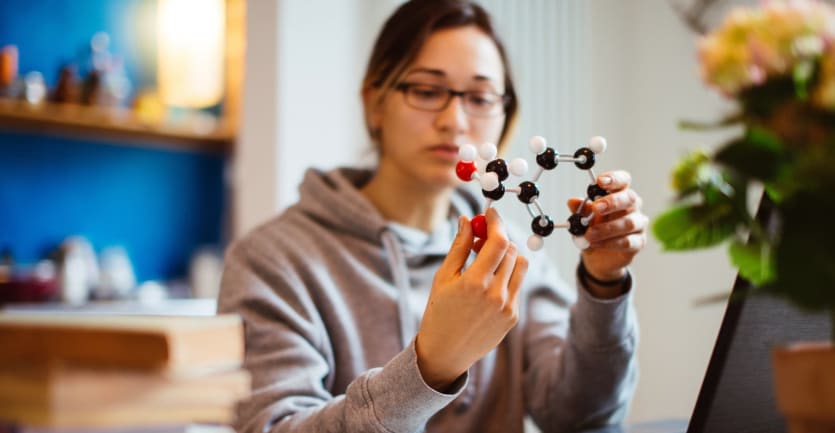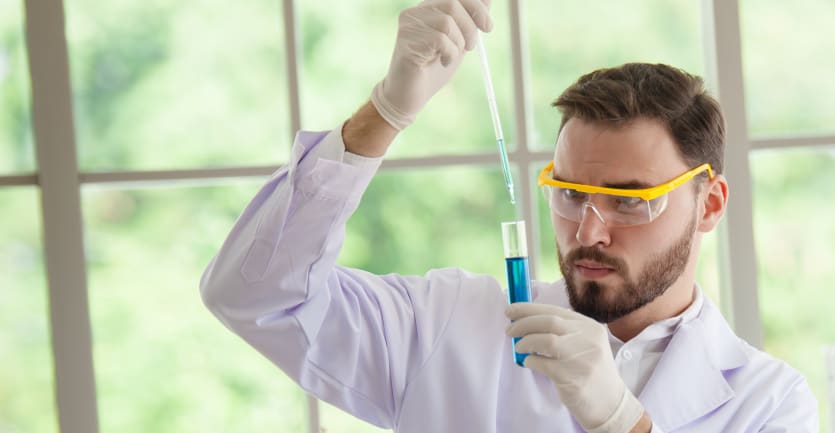What to Expect in an Online Science Lab Course
Once thought impossible to offer digitally, science labs pose unique logistical challenges. But technology advancements and innovative instructional strategies now allow students to successfully complete lab assignments at home in subjects such as biology, chemistry, physics, geology, and anatomy/physiology.
Online science lab classes often incorporate a combination of tools and strategies, including what’s referred to as “kitchen chemistry” — using items that are either already in your home or easy to find. Your professor may also conduct demonstrations via video for you to watch and respond to in discussions and other assignments.
These days, at-home lab kits, as well as digital simulations and virtual labs, are becoming more common as colleges continue to offer online courses that began in response to the coronavirus pandemic.

At-Home Lab Kits
Did you have a chemistry set when you were younger? Or maybe a circuit-building electronics kit? Using a special kit for your online science lab can be similar to these, only it’ll be designed to help you learn college-level scientific principles.
A lab kit gives you all the necessary equipment to conduct experiments at home.
Lab kits allow you to conduct experiments at home and include some of the same basic equipment found in a laboratory classroom on campus. Hands-On Labs, eScience Labs, and the Carolina Biological Supply Company are just a few companies offering at-home lab kits designed for use in online college classes.
Lab kits can be tailored to meet the needs of nearly any science curriculum. If your professor decides to use one or more of these kits, they’ll usually coordinate what they require with a specific company before the class starts.
 What’s in a Lab Kit?
What’s in a Lab Kit?
Science lab kits include three basic types of items. The table below contains examples of what you can expect to receive in a kit. Note that the exact items you get will differ by company and any customization coordinated by your professor.
Many of these pre-assembled kits include instructions and worksheets for specific experiments. Your instructor will tell you what you need to complete and when. Be sure to check your syllabus for details and ask questions if you aren’t sure about something.
 How Much Do Online Lab Kits Cost?
How Much Do Online Lab Kits Cost?
One drawback of at-home lab kits is often the price. Depending on the number of experiments you do and the types of topics you cover, a basic kit with supplementary experiment packages can really start to add up.
The cost of a starter lab kit ranges from $30 to more than $200.
These costs vary by company, with starter kits ranging from approximately $30 to more than $200. What’s more, prices for specific lesson kits for topics like cell structure, blood typing, light refraction, or groundwater analysis can vary widely.
Plan for these costs as you would for textbooks or other required class materials. If you are receiving a scholarship or some kind of financial assistance that covers textbooks and course materials, see whether science lab kits are covered.
Before you buy a kit, make sure you know exactly what the professor has selected and where to order it from. You can check with your college’s bookstore, which may have the kit in stock or may be able to share other ordering instructions. As with a textbook, allow time for shipping and delivery.
 Safety First
Safety First
Campus-based laboratory classrooms house plenty of safety equipment. The companies providing at-home lab kits are aware of this and include materials they’ve tested and selected with safety in mind. You may be required to complete a module on lab safety before you conduct your first official experiment.
As you prepare for your online lab course, consider where you will work. You’ll need a safe space to set up your kit and complete your assignments, as well as a place to store your kit and all related materials when you aren’t using them.
As you prepare for your online lab course, consider where you will work. You’ll need a safe space to set up your kit and complete your assignments.
Think about who could access your kit, such as any young children, and secure it appropriately. Some items might need refrigeration or other specific conditions for safe storage.
Always follow the instructions for each investigation you conduct, and always use the protective items that come with your kit, whether that’s goggles, gloves, or an apron.

Simulations and Virtual Labs
Simulations and virtual environments let you conduct a wide variety of scientific investigations without the expense or safety issues related to lab kits. That said, these experiences are further removed from the hands-on work you’d perform in a laboratory setting.
The terms “simulation” and “virtual lab,” which are sometimes used interchangeably, encompass an array of tools and interfaces that allow you to explore scientific principles on your own.
 What Is a Simulation?
What Is a Simulation?
In the context of an online science lab, simulations are digital presentations used to show you how something works. Examples of simulations include demonstrating a law of physics, illustrating a chemical reaction, or exploring the effects of gravity.
Simulations typically use graphics and animations to present specific topics.
HHMI BioInteractive and the University of Colorado Boulder’s PhET Interactive Simulations project are two sources of scientific simulations. Browse these sites to learn how they work and what to expect if simulations are part of your lab course. Most simulation interfaces use graphics and animations to present each topic.
Some simulations are like videos — you simply click play and watch the simulation take place — whereas others are interactive, allowing you to manipulate variables in the simulation to discover different outcomes. For example, PhET’s pH Scale simulates testing the pH level of various liquids, which you control. Other simulations use a game format.
 What Is a Virtual Lab?
What Is a Virtual Lab?
Virtual lab applications are similar to simulations in that you view them on a screen to explore a specific scientific topic; however, these tools typically provide a more immersive experience. The use of 3D models and in some cases augmented or virtual reality allows you to become a more active participant in the simulation.
Labster, Visible Body, and CloudLabs are three examples of virtual lab tools focused on science and math topics. According to Labster, virtual labs “allow students to work through real-life case stories, interact with lab equipment, perform experiments, and learn with theory and quiz questions.”
Your course may also let you build your own digital models using applications like Sketchfab. Mobile versions are available for many of these virtual lab tools.
Questions to Ask Before Your Online Lab Class Begins
Below are several questions you can ask your instructor or other school employees if you’re worried about what your online lab class will entail. Use these as a starting point to find out what you should expect and how you can prepare yourself to succeed.
Is a Course Syllabus Available?
Some schools make their syllabi available online for review, but if not, ask the academic department for a copy of the syllabus. Look for details about what materials you’ll need to buy and descriptions of class assignments.
Is There a Course Demo?
Demos can show you more clearly what to expect in an online lab. Oregon State University’s Ecampus, for instance, includes an online course multimedia showcase. The virtual microscope lab, augmented reality sandbox, and virtual boat field trip show students examples of the virtual tools used in online labs.
What Support Is Available?
Once your class starts, find out whom you can direct your questions to, such as your professor or teaching assistant, and get help troubleshooting the specific tools your class will be using by consulting lab kit companies or your school’s help desk.
Are Group Projects Required?
While many of the tools required for online labs are designed for students to use on their own, you should expect the possibility of working in a small group to share, discuss, and collaborate on class topics and assignments.
How Will You Be Graded?
You’ll likely have different types of assignments and tests in your online science lab, making documenting your work with lab kits, online simulations, and virtual labs highly important. Find out the expectations for these tasks and how to submit your work.
Contrary to what you might think, even a science lab can be a successful online course. These environments require a lot of coordination and generally a lot of supplies, but as long as you know how to prepare yourself, you can walk away with a worthwhile learning experience.
Take the time to find out about online lab courses offered at your institution. And don’t be afraid to embrace the opportunity to engage in science at a distance.